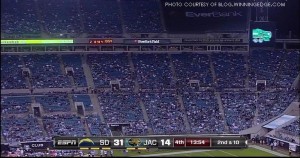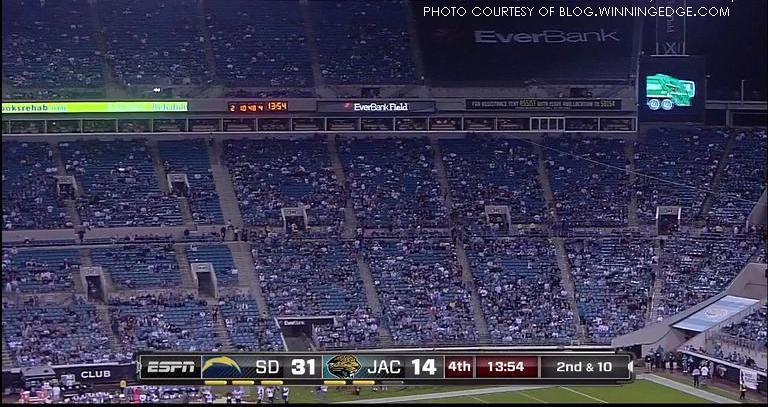
Two decades ago, television blackouts were an everyday aspect of the sports-watching experience. The over-the-air availability of a game was never quite certain; even the most die-hard fan felt pushed to pay for tickets rather than roll the dice on watching from their couch.
They weren’t popular. But they were effective.
Today, the power of the masses — the lobbying cable super-corporations and the millions of sports-fan couch potatoes — has all but eliminated blackouts from sports.
The NFL radically loosened their blackout rules prior to the 2012-13 season, requiring teams to sell only 85 percent (rather than 100 percent) of their tickets within 72 hours of home games in order to avoid a local TV blackout.
The shift in policy came about a year after an NBC report of steadily declining league-wide attendance. The NFL reached a 10-year attendance low in 2011-12, down 782,000 total ticket sales (about 3,000 per game) from 2007’s all-time high.
The two trends seem to be contradictory. Blackouts are intended to encourage fans to leave their 64-inch plasmas and support their favorite team in-stadium; reducing the potential of such motivation would appear to have the opposite effect. Yet NFL commissioner Roger Goodell was ignorant of the irony.
Four of the 32 franchises, however, weren’t. The Buffalo Bills, San Diego Chargers, Cleveland Browns and Indianapolis Colts all opted out of the new rule to keep their blackout avoidance level at 100 percent attendance, thus hopefully increasing ticket sales and henceforth revenue. Unsurprisingly, three of those four squads had finished in the bottom quarter of the league in attendance and the bottom half in overall revenue the previous year.
“We are not going to participate in the relaxed-manifest rule,” said an irritated Russ Brandon, the Bills’ chief financial officer. “We are a volume-based business, and for us to be successful, we need to keep our ticket prices low and sell a greater number of tickets.”
Brian Higgins, a U.S. Representative from the Buffalo area, was also upset. “I think [the new rule is] disappointing, and I think it’s somewhat short-sighted,” he said. “I’m disappointed that they didn’t take into account the loyalty of the fan base here in Buffalo.”
The blowback the Bills confronted at the time has only increased this fall, as they’ve needed to offer discounted tickets and receive extra ticket-selling extensions from the NFL to avoid such self-created blackouts.
Yet Buffalo isn’t the only team in trouble — they’re just the only team in trouble with potential blackout consequences.
The Tampa Bay Buccaneers are experiencing their first season in a long time without an almost inevitable weekly blackout; prior to this year, 19 of their last 26 home games were axed from standard television.
The Oakland Raiders and St. Louis Rams, through three home games each, aren’t even hitting the 85 percent sales marker — yet, somehow, they’ve still managed to avoid being shut off the ‘tube’. Per an MSN report, the Raiders may be avoiding the blackout by using advertising tarps to decrease official stadium capacity and henceforth increase attendance percentage.
The woeful Jacksonville Jaguars have even resorted to giving away free beer to sell more tickets.
It’s blatantly evident that the NFL’s new blackout leniency is doing no wonders for attendance in under-supported cities. Compared to America’s other major sports leagues, however, the NFL is still employing an antique system.
As of 2013, the MLB, NBA, NHL and MLS have all removed any attendance-based lockout restrictions. Instead, blackouts are based only on channel rights — national providers granted priority over local stations — and rarely (if ever) prevent fans from watching their city’s team lazily from home.
Regional TV networks are blacked out from game coverage if the game is being carried by a national carrier — such as FOX (for MLB), TBS (for NBA) and NBC (for NHL) — at the same time. Nonetheless, even teams like the MLB’s Cleveland Indians (45.3 percent average attendance in 2013), NBA’s Detroit Pistons (67.0 percent average attendance in 2012) and MLS’s New England Revolution (63.0 percent average attendance in 2013) are still shown on television no matter how many empty seats remain unfilled.
John McCain, prominent U.S. Senator, even proposed a bill in June that would ban blackouts from sports altogether. “Now, if that stadium is not taxpayer-financed, then that owner can do anything they want to. But if the taxpayers paid for them then, by God, I think the taxpayers ought to be able to see the game whether they sell out the stadium or not,” he told reporters.
Ten years from now, blackouts could easily be a thing of the past. Whether or not that seemingly inevitable fate will benefit the sports industry as a whole, though, has yet to be determined.

Leave a Reply